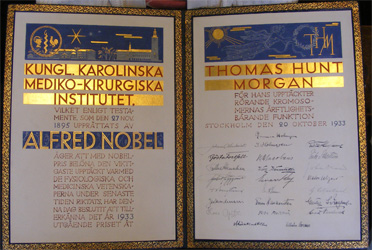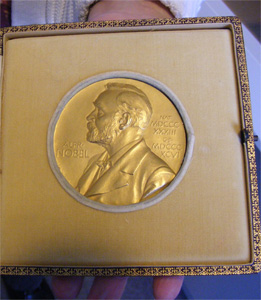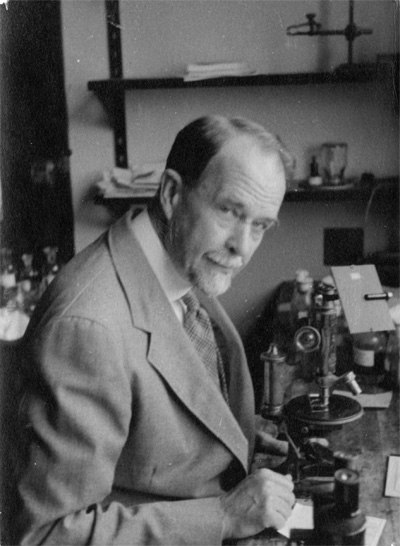MBL Receives Gift of T. H. Morgan’s Nobel Prize Medal and Diploma

Three granddaughters of Thomas Hunt Morgan, the late MBL scientist, trustee, and pioneer of modern genetics, have donated his Nobel Prize medal and brilliantly colored diploma to the MBL Archives.
In 1933, Morgan received the first Nobel Prize ever awarded in the field of genetics for his “discoveries concerning the role played by the chromosome in heredity."
“Woods Hole has had a central place in the hearts and lives of the Morgan family for over 122 years,” said Barbara Morgan Roberts of Mission, Kansas, Morgan’s oldest granddaughter. “We can’t imagine leaving our grandfather’s Nobel Prize any other place than at the MBL.”
 The diploma for T.H. Morgan's 1933 Nobel Prize in Physiology or Medicine, which is now in the MBL Archives. Photo by Diana Kenney
The diploma for T.H. Morgan's 1933 Nobel Prize in Physiology or Medicine, which is now in the MBL Archives. Photo by Diana KenneyMorgan first came to the MBL as a student in 1889, one year after the laboratory opened its doors. For the next half-century, Morgan returned nearly every summer to the MBL to conduct research, while also serving on the faculty at Columbia University and later California Institute of Technology. He and his wife, biologist Lilian Vaughan Morgan, built a home in 1906 on Buzzards Bay Avenue in Woods Hole, and successive generations of their children and grandchildren continue to summer in Woods Hole to the present day. (Lilian co-founded what is now the Children’s School of Science in Woods Hole in 1913.) Morgan also served as an MBL Trustee and/or Corporation member almost continuously from 1890 until his death in 1945.
A pioneer of using fruit flies (Drosophila) for genetic research, Morgan proved that the hereditary material was located on the chromosomes. Working both at the MBL and at Columbia University, in the 1910s Morgan and his colleagues constructed the first maps of gene location on fruit-fly chromosomes. His Nobel Prize in Physiology or Medicine recognized the far-reaching implications of this work, which launched a century of genomic inquiry that triumphed with the mapping of the human genome in 2000.
 MBLWHOI Library co-director Diane Rielinger holds Thomas Hunt Morgan's Nobel Prize medal. Photo by Diana Kenney
MBLWHOI Library co-director Diane Rielinger holds Thomas Hunt Morgan's Nobel Prize medal. Photo by Diana KenneyThe gold Nobel Prize medal depicts the profile of Alfred Nobel (1833-1896), the Swedish chemist and engineer who invented dynamite, among hundreds of other innovations. In his will, Nobel specified that his fortune be used to create prizes for those who confer the "greatest benefit on mankind" in physics, chemistry, peace, physiology or medicine, and literature. The prizes have been awarded every year since 1901, and have come to be regarded as the highest honor in their respective fields.
Morgan’s beautiful Nobel diploma, created by artist Jerk Werkmäster, depicts gold-roofed buildings and a woman with a laurel wreath floating under a radiant sun. In 1965, the Physiology or Medicine diplomas were simplified to omit art, and they now show only a relief illustration of the Nobel medal and calligraphic text.
To commemorate Morgan’s long affiliation with the MBL, a symposium was held in his honor in 2010, with attendees including Barbara Morgan Roberts and her sisters, Connie Morgan Allard and Pamela Morgan Jacobsen. The sisters, who are the children of Morgan’s only son, Howard, decided this fall to give their grandfather’s Nobel Prize medal and diploma to the MBL. They also placed in the MBL Archives Morgan’s 1939 Copley Medal from the Royal Society of England, and an ornate medallion and chain he received from Pope Pius XII in recognition of his early biological studies at the Stazione Zoologica in Naples. Previously, Connie Morgan Allard placed one of Morgan’s dissecting microscopes in the MBL Archives.
 Thomas Hunt Morgan at his bench in the MBL's Crane Laboratory, late 1930s. Photo courtesy of MBL Archives.
Thomas Hunt Morgan at his bench in the MBL's Crane Laboratory, late 1930s. Photo courtesy of MBL Archives.“These awards are testament to the intellect and insight of one of the greatest biologists of the 20th century, who also contributed crucially to the MBL during its first five decades,” said Diane Rielinger, co-director of the MBLWHOI Library. “We are grateful to T.H. Morgan’s family and honored to add Morgan’s awards to our Archives.”
“By leaving these symbolic mementos at the MBL, we have the sense that we will all be in Woods Hole forever,” Barbara Roberts said.
Resources:
Kenney, D.E. and Borisy, G.G. (2009) Thomas Hunt Morgan at the Marine Biological Laboratory: Naturalist and Experimentalist. Genetics 181: 841-846.